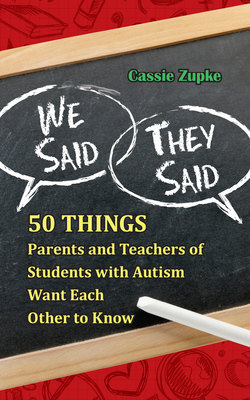Читать книгу We Said, They Said - Cassie Zupke - Страница 16
На сайте Литреса книга снята с продажи.
Оглавление
Before I knew my child had difficulties, my goals for him were simple: to enjoy life, love, and happiness—the same plan all parents have for their children. Having wealth, independence, and a few grandchildren were in there somewhere too, because that's just the way parents are. We want our children to be able to leave the nest someday and have the skills needed to go build one of their own.
When things started to get tough, my goals changed. For a while, it was enough just to have my son live to reach adulthood. In those days of his whirlwind activity and little common sense, I was sure I'd lose him. Just let him live, I prayed. Whatever comes next I will deal with, but don't let me lose him before he's 3 years old. When he made it to the age of 3, I prayed he would make it to 5 years. And when he made it that far, I prayed he would make it to 7.
Slowly, as he grew, his life became more stable. I realized there was a very good chance he would make it to adulthood. Then what? How would my son live as an adult? Would he be dependent on me? Or (an even scarier thought) dependent on someone else? Would he be naive and unsuited for facing the challenges of the real world? Would he land himself in prison? After all, social blunders that are no-no's when you're 6 years old become criminal offenses by the time you're 20. More than anything else, I wanted to enjoy the relative safety of normalcy. If my son was “normal,” then he would be ready at some point to face the world on his own. I wanted someone, somewhere, to find a way for my little boy to grow up to be just like all the other kids. I didn't want him to have a hard life, and I didn't want one for myself either. I wanted normal.
It took a few more years for me to figure out that “normal” wasn't going to happen. My boy wasn't going to be a typical kid. Not now, not ever. He would improve and build skills and mature, but his autism was always going to be there, waiting and setting traps here and there for the rest of his life. It was a hard realization for me. My goals evaporated. As I came to understand that there was no path to reach them, I let them go. Instead, I kept my eyes on today and what was immediately in front of us, ignoring a future I didn't want to contemplate. If he could be 10 years old forever, tucked here under my wing, I thought maybe then I could keep him safe, and perhaps I could make sure he had a happy life. I replaced my goals with denial to preserve my sanity.
I hadn't given up; not really. I was taking a breather. I indulged in an emotional trip past reality so I could heal myself enough to face tomorrow, enough to look down deep and find my sweet little boy again in that jumble of blue jeans and dirty sneakers and differences. He wasn't going to be a typical kid, not now, not ever, but that was okay. He was still wonderful, even with one foot in another world. His life would be filled with challenges, but that's what life is; with or without autism, everyone has hills to climb. He had skills and talents—we could build on them. His weaknesses wouldn't be so bad if he was aware of them and had tools to work around them. His life might be difficult, but that was okay, because I could help him find his place in the world.
So what do I want for him now? Life, love, and happiness—the same hopes all parents have for their children. Wealth, independence, and a few grandchildren are in there, too, but if those things aren't in the cards for us, it's okay. Happiness and security will be enough for me.
